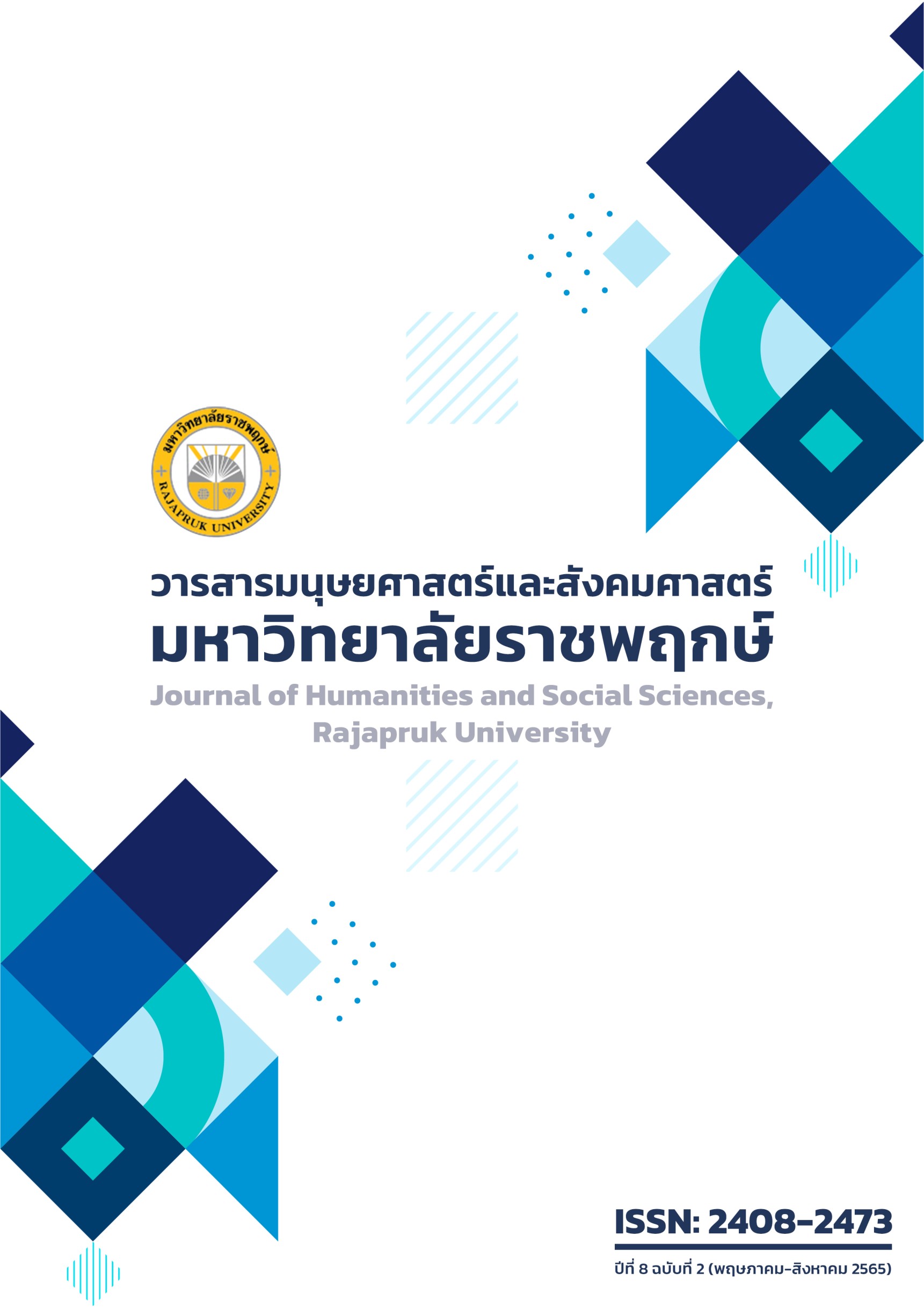The Priority Needs of Academic Management Development of School under UNESCO Associated Sch
Main Article Content
Abstract
The purpose of this research was to study the priority needs of academic management development of schools under the UNESCO Associated Schools Network in Thailand based on the concept of holistic leadership. This research applied a quantitative approach. The population was schools under UNESCO Associated Schools Network (ASPnet) in Thailand, total of 105 schools. The samples were 84 schools, selected by applying the multi-stage random sampling. A total of 336 subjects including school directors or deputy directors, head teachers of the class, class teachers, and student council presidents were used in this study. The research instrument was a 5-level rating scaled questionnaire with overall reliability of 0.984. The data were analyzed by frequency distribution, percentage, mean, standard deviation and Modified Priority Needs Index (PNImodified). The results of this study revealed that the priority needs of academic management development of schools under the UNESCO Associated Schools Network in Thailand based on the concept of holistic leadership could be classified into two groups. According to academic management, the highest priority needs index was Assessment and Evaluation (PNImodified=0.271), followed by Instructional Media and Learning Resource Development (PNImodified=0.261), Instructional Management (PNImodified=0.244), and Curriculum Development (PNImodified=0.232), respectively. In terms of the concept of holistic leadership, the highest priority needs index was Human Competencies or People Skills (PNImodified=0.260), followed by Self Competencies or Self Skills (PNImodified=0.254) and Technical Competencies or Work Skills (PNImodified=0.245), respectively.
Article Details
References
กระทรวงศึกษาธิการ. (2550). กฎกระทรวง: กำหนดหลักเกณฑ์และวิธีการกระจายอำนาจการบริหารและการจัดการศึกษา พ.ศ.2550. ราชกิจจานุเบกษา, เล่มที่ 124 ตอนที่ 24 ก (16 พฤษภาคม 2550), หน้า 29. ค้นเมื่อวันที่ 24 พฤศจิกายน 2562, จาก https://www.moe.go.th/กฎกระทรวง/.
กระทรวงศึกษาธิการ. (2551). หลักสูตรแกนกลางการศึกษาขั้นพื้นฐาน พุทธศักราช 2551. กรุงเทพฯ: โรงพิมพ์ชุมนุมสหกรณ์การเกษตรแห่งประเทศไทย.
กันย์ธนัญ สุชิน. (2557). การเสริมสร้างศักยภาพของผู้นำเด็กและเยาวชนในชุมชน เทศบาลตำบลบ้านดู่ อำเภอเมือง จังหวัดเชียงราย. วารสารวิจัยเพื่อการพัฒนาเชิงพื้นที่ มหาวิทยาลัยวลัยลักษณ์, 6(5): 76-93.
กิติมา ปรีดีดิลก. (2532). การบริหารและการนิเทศการศึกษาเบื้องต้น. กรุงเทพฯ: อักษราพิพัฒน์.
เกรียงศักดิ์ เจริญวงศ์ศักดิ์. (2550). ภาวะผู้นำ สร้างได้ในวัยเยาว์. ค้นเมื่อวันที่ 12 พฤศจิกายน 2562, จาก http://www.kriengsak.com/node/548.
โชติกา ใจทิพย์ และ กฤษดา เชียรวัฒนสุข. (2561). ศักยภาพของผู้นำองค์กรธุรกิจในสถานการณ์โลกที่มีความผันผวน ความไม่แน่นอน ความซับซ้อน และความคลุมเครือ. วารสารการจัดการธุรกิจ มหาวิทยาลัยบูรพา, 7(1): 1-14.
พรพรรณ ธรรมธาดา. (2559). กลยุทธ์การบริหารงานวิชาการตามแนวคิดการเสริมสร้างคุณภาพนักเรียนที่มีความสามารถพิเศษเพื่อการพัฒนาที่ยั่งยืน. วิทยานิพนธ์ครุศาสตรดุษฎีบัณฑิตสาขาวิชาบริหารการศึกษา คณะครุศาสตร์ จุฬาลงกรณ์มหาวิทยาลัย.
พิชัย เสงี่ยมจิตต์. (2542). การบริหารงานเฉพาะด้านในสถาบันการศึกษา. คณะครุศาสตร์ สถาบันราชภัฏอุบลราชธานี.
พูนภัทรา พูลผล. (2554). การพัฒนารูปแบบการบริหารงานวิชาการของสถานศึกษาขั้นพื้นฐานเพื่อเตรียมผู้เรียนสู่ความเป็นพลเมืองโลก. วิทยานิพนธ์ครุศาสตรดุษฎีบัณฑิต สาขาวิชาบริหารการศึกษา คณะครุศาสตร์ จุฬาลงกรณ์มหาวิทยาลัย.
ภาณุวัฒน์ ภักดีวงศ์ และ กฤษณา วรรณกลาง. (2563). นวโกวาทกับการเป็นเครื่องมือในการใช้ชีวิตของคนในยุคสังคมพลิกผัน. วารสารการบริหารและนวัตกรรมการศึกษา จุฬาลงกรณ์มหาวิทยาลัย, 3(1): 91-112.
วิลาวัลย์ พงษ์สุนทร และธันยธรณ์ สุขพานิช. (2557). ภาวะผู้นำด้านสุขภาพแบบองค์รวมของโรงพยาบาลเจ้าพระยาอภัยภูเบศร. วารสารครุศาสตร์อุตสาหกรรม สถาบันเทคโนโลยีพระจอมเกล้าเจ้าคุณทหารลาดกระบัง, 13(3): 128-134.
สำนักความสัมพันธ์ต่างประเทศ สำนักงานปลัดกระทรวงศึกษาธิการ. (2561). เอกสาร “โครงการการประชุมเชิงปฏิบัติการเครือข่าย Associated Schools Project Network เพื่อศึกษาแนวทางการดำเนินงานตามวาระการพัฒนาอย่างยั่งยืนของสหประชาชาติ”. กระทรวงศึกษาธิการ.
สำนักงานคณะกรรมการการศึกษาขั้นพื้นฐาน. (2562). นโยบายสำนักงานคณะกรรมการการศึกษาขั้นพื้นฐาน ปีงบประมาณ พ.ศ.2562. กรุงเทพฯ: กระทรวงศึกษาธิการ.
สำนักงานเลขาธิการสภาการศึกษา. (2560). แผนการศึกษาแห่งชาติ พ.ศ.2560- 2579. กรุงเทพฯ:พริกหวานกราฟฟิค.
สุนทร โคตรบรรเทา. (2552). หลักการและทฤษฎีการบริหารการศึกษา. กรุงเทพฯ: ปัญญาชน.
Benson, L. (1991). A Youth Leadership Training Case Study. Ph.D. Dissertation. Ottawa: University of Alberta.
Best, K. Candis (2011). Holistic Leadership: A Model for Leader-Member Engagement and Development. The Journal of Values-Based Leadership, Valparaiso University, 4(1): 1-19.
Brauckmann, S. (2011). A Validation Study of the Leadership Styles of a Holistic Leadership Theoretical Framework. International Journal of Educational Management, Open University of Cyprus, 25(1): 11-32.
Clerkin, C., & Ruderman, M.N. (2016). “Holistic Leader Development: A Tool for Enhancing Leader Well-Being”. In W. A. Gentry & C. Clerkin (Eds.), the Role of Leadership in Occupational Stress (Research in Occupational Stress and Well Being), 14: 161–186. Bingley: Emerald Group Publishing Limited.
Consulus. (2019). HERO Leadership Competency Model [White Paper]. Copyright by Consulus PTE. LTD.
Dhiman, S. (2017). Holistic Leadership: A New Paradigm for Today’s Leaders. Springer: Palgrave Macmillan US.
Funk, J. (2016). Holistic Leadership Competency Model for Healthcare [White Paper]. Copyright by J L Funk & Associates.
Larcher, B. (2011). Holistic Leadership. Horizons: The Journal of the College Theology Society, Villanova University. 53: 11-13. London: Cambridge University Press.
Orlov, J. (2003). The Holistic Leader: A Developmental Systemic Approach to Leadership. The Los Angeles Chapter of the American Society for Training and Development. Los Angeles: California.
Quatro, S., & Waldman, D., & Galvin, B. (2007). Developing Holistic Leaders: Four Domains for Leadership Development and Practice. Human Resource Management Review, 17: 427–441.
Taggart, J. (2011). Becoming a Holistic Leader: Strategies for Successful Leadership Using a Principle-Based Approach. Second Edition. Ottawa: Canada.
Taliaferro, Donna. (2014). Holistic Leadership. Journal of Holistic Nursing, American Holistic Nurses Association, 32(4): 248-249.
Thaker, S. (2018). Holistic Leadership Development: An Integration of HRD Practices and Gurukul Learnings. Gujarat: Parul University.
Tuyishime, G. A. and Rosa, W. (2017). The Holistic Leadership Model and the Nurse Unit Manager: Assessing Requisite Leadership Competencies in the Rwandan Context. Rwanda Journal Series F: Medicine and Health Sciences, 4(1): 17-21.
UNESCO. (2012). UNESCO Associated Schools Network. Retrieved November 9, 2020, from https://aspnet.unesco.org/en-us/Pages/Membership.aspx.
UNESCO. (2015). Global Citizenship Education: Topics and Learning Objectives. France: UNESCO.


